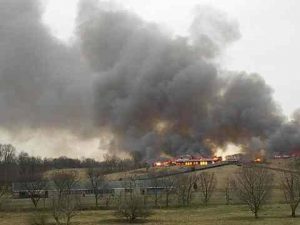
Open burning of buildings at the closing Indiana Army Ammunition Plant released unsafe levels of lead to the air during a March 11 burn, state officials said. (Photograph by Indiana Department of Environmental Management)
Recent testing by the Indiana Department of Environmental Management (IDEM) found that air emissions from open burning explosives-contaminated buildings at Indiana Army Ammunition Plant exceeded federal air-quality standards for lead. As a result, IDEM is expected to take steps to reduce future emissions including requiring the U.S. Army to do a more thorough clean-up of the buildings before setting fire to any additional structures.
So far, the Army has burned 64 buildings on four occasions since February 2004. In response to community concerns about public health, air testing was conducted once, during the final burn on March 11.
The tests found that unsafe levels of lead were present in the air at the closing base. While levels of lead – a toxin associated with neurological defects and developmental delays – were elevated for a limited period of time, the exceedances have local officials concerned.
IDEM officials overseeing the project expressed regret that testing was not done for the initial burns. “In hindsight, I guess it would have been good if we had done sampling of the air during the first fire, even though the report revealed no major health concerns,” an IDEM spokesperson said.
The smoke plume from the fires generally was present for only two hours, with the fires smoldering for perhaps another four hours, IDEM officials said. It is unclear if the lead came from bits of metal pipes and joints, from paint, or from ingredients in the munitions themselves, they said.
Before the third round of fires, the state issued a public advisory stating that they posed “minimal potential for adverse health effects” but adding that “people concerned about that potential harm may choose to take precautions, such as remaining indoors while the fire burns.”
In addition to pollution preventions measures, IDEM is expected to require the Army to do its own air testing, with quality controls in place to ensure the accuracy of future results.
